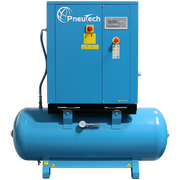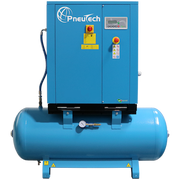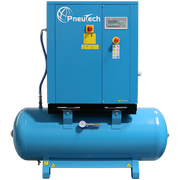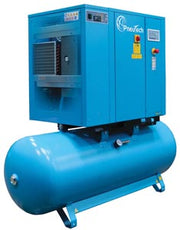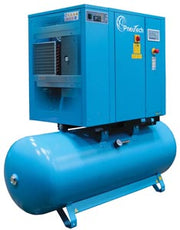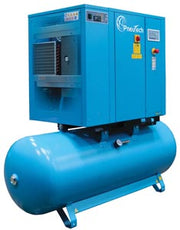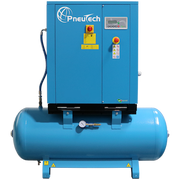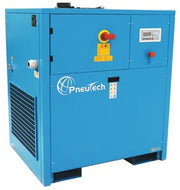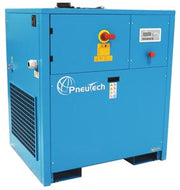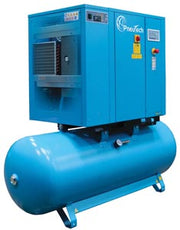

Rotary Screw Air Compressors
Rotary screw compressors are now the standard for most of the compressed air produced in the United States. These versatile units can be configured as base mounted, tank mounted, or as a part of a Total Air System.
About Our Rotary Screw Air Compressors
We offer high-quality rotary screw air compressors from PneuTech. A rotary screw air compressor is an excellent choice for industrial applications requiring continuous production of clean, dry compressed air. With a 100% duty cycle, a rotary screw air compressor is best for continuous production applications. We sell, install and service:
- Oil-flooded rotary screw air compressors
- Oil-free rotary screw air compressors
- Variable speed drive (VSD) rotary screw air compressors
Rotary screw air compressors offer significant advantages for many applications.
- 100% duty cycle for continuous 24/7 operation
- Quiet operation (68-75 dBA) with low vibration and very little pulsation or flow surge
- Energy efficiency
- Low oil carryover for cleaner compressed air
- High reliability and long life, up to 60,000 - 80,000 hours of operation (3 to 5 times as long as a piston-style compressor)
- Standard sizes from 4HP to 350HP
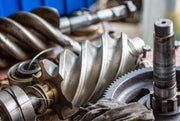

Get in Touch Today
We are here to serve your compressed air system needs 24/7/365. Call or click today!
Contact usFAQ
How does a rotary screw air compressor work?
A rotary screw compressor uses the positive-displacement method, with air produced by two closely meshed helical screws (rotors) that compress the air. In an oil-flooded rotary screw compressor, the lubricating oil fills the gap between the rotors, providing a hydraulic seal and transferring the mechanical energy between the rotors, resulting in a continuous motion. This allows them to run at a 100% duty cycle for applications requiring continuous production of air.
- The two enmeshed helical screws or rotors turn rapidly, powered by the air compressor motor.
- The revolution of the screws forces air through the chambers. This creates a vacuum, which pulls more air into the chamber through the air compressor air intake.
- As air moves through the successive chambers of the paired rotors, it is squeezed into a smaller volume, resulting in air compression.
- Compressed air exits the screw unit, where it can be captured, dried, filtered, and used or stored.
Read more about how rotary screw air compressors work.
How long does a rotary screw air compressor last?
Rotary screw air compressors are known for their reliability and longevity. With proper care, an oil-flooded rotary screw air compressor can last up to 60,000 - 80,000 operating hours–or nearly ten years of continuous use–before requiring a rebuild. That’s 3 to 5 times as long as a piston-style air compressor. At that point, a rebuild of the air end is likely to be needed. (Note that oil-free rotary screw air compressors have a shorter service life due to the increased wear on the rotors.)
To extend the lifespan of your rotary screw air compressor, be sure to perform all required maintenance activities. For oil-flooded rotary screw compressors, the most critical thing is to ensure that they do not run low on oil. If the oil runs low, or loses its lubricating capabilities, severe damage to the air end can occur. Be sure to check oil levels frequently and change oil on the schedule recommended by your operating manual to prevent problems like varnish that can damage the rotors.
Talk to your Fluid-Aire Dynamics service team about setting up a maintenance plan to ensure the longevity of your rotary screw air compressor.
What is a rotary screw air compressor used for?
Rotary screw air compressors are used in a wide variety of industrial applications. Because they have a 100% duty cycle, they are best used for applications requiring continuous airflow. They are an excellent choice for applications such as robotic manufacturing, pneumatic conveyor systems, paint lines, food processing applications and packaging lines. If demand varies over the course of a shift, day, week, or season, a variable speed drive (VSD) rotary screw air compressor will adjust to demand in real time for greater energy efficiency. Rotary screw air compressors are ideal for:
- Continuous use
- Large CFM demand
- Applications requiring clean air with low oil carryover
Not sure whether a rotary screw air compressor is right for your application? Talk to one of our compressed air experts.
